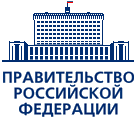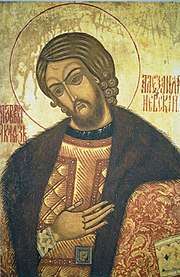List of heads of government of Russia
.jpeg)
Approximately 98 people have been head of the Russian government since its establishment in 1726. The chairman of government was a member of the Supreme Privy Council, which was created on 8 (19) February 1726 by Empress Catherine, and from 8 (20) September 1802 ministerial duties were allocated by the Committee of Ministers, which was established on in accordance with the proclamation of Emperor Alexander II. Beginning with Count Aleksandr Romanovich Vorontsov, the eldest of the officers was de facto chairman of the committee. Eight years after the inauguration of the manifest, the first de jure office holder was Count Nikolay Rumyantsev.[1] The Council of Ministers was unofficially formed in October 1857, as a result of Emperor Alexander II's reforms; its first session began on 19 (31) December 1857. Before the actual formation of that body on 12 (24) November 1861, the Emperor himself was in charge. The Council of Ministers consisted of chairmen of the State Council and the Committee of Ministers, as well as high-ranking officers appointed by the Emperor. The first session ended on 11 (23) December 1882, after the number of files to the Council greatly decreased.[2][3]
The Committee of Ministers functioned simultaneously with the second session of the Council of Ministers for six more months; Count Sergei Witte participated on both entities until the abolition of the committee on 23 April (5 May) 1906. Following that event, the duties of the committee were left to the Council of Ministers, until the formation of the Small Council in 1909, which also included deputy ministers. By the order of Emperor Nicholas II, the second session of the Council of Ministers began on 19 October (1 November) 1905, following the formation of the State Duma. Shortly after the February Revolution and the inception of the Russian Provisional Government on 2 (15) March 1917, Georgy Lvov from the Constitutional Democratic Party and Alexander Kerensky from the Socialist Revolutionary Party became joint Minister-Chairmen. The provisional Russian Republic was eventually replaced by the Russian Soviet Federative Socialist Republic (RSFSR) and the governmental body by the Council of People's Commissars, which was chaired from 1917–24 by Vladimir Lenin. That body was renamed Council of Ministers following a decree of the Supreme Council on 23 March 1946.
After the fall of the Soviet Union, Boris Yeltsin, as the President of the Russian Federation, was automatically appointed as the Head of Government of the Russian Federation in the first two years of his mandate. The latter body took the previous name "Council of Ministers", the chairman of which became Viktor Chernomyrdin from the Communist Party of the Russian Federation, replacing acting chairman Yegor Gaidar. According to the new constitution ratified on 25 December 1993, those two entities were separated. Since then, the head of that office takes the formal title "Chairmen of the Government" or colloquially "Prime Minister" (the only actual prime minister was Valentin Pavlov). Chernomyrdin resumed chairing the government, followed up by non-partisans and acting office holders. On 8 May 2008, Vladimir Putin took the office for a second term, now as a member of United Russia. Dmitry Medvedev has been the Chairman of the Government since 8 May 2012.[4]
The youngest head of government by his accession to office was Count Karl-Fridrikh Golshteyn-Gottorpsky, at age 26, and the oldest Count Pyotr Andreyevich Tolstoy, at age 81.
Russian Empire (1726–1905)
Since the 18th century, a modern system of public administration was going to be created in Russia, including the formation of bodies whose powers are similar to the powers of the modern Russian Government. In the period from 1726 to 1905 there was no official title for the leader of the government. The chief ministers (principal ministres) of certain Emperor of Russia nonetheless led the government de facto, but de jure the head of government was a monarch.[5]
| Portrait | Name (Birth–Death) | Term of office | Emperor | ||||
|---|---|---|---|---|---|---|---|
| Members of the Supreme Privy Council of the Russian Empire (1726–1730) | |||||||
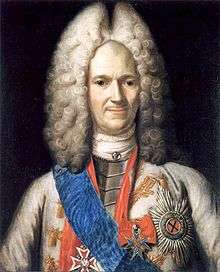 | Count and Prince Alexander Danilovich Menshikov (1673–1729) | 8 February 1726 | 8 September 1727 | Catherine I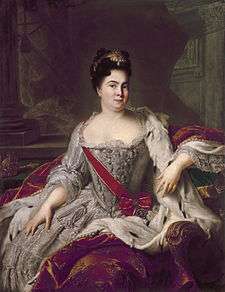 (1725–1727) Peter II .jpg) (1727–1730) Anna .jpg) (1730–1740) | |||
 | Count Fyodor Matveyevich Apraksin (1661–1728) | 8 February 1726 | 10 November 1728 | ||||
.jpg) | Count Gavriil Ivanovich Golovkin (1660–1734) | 8 February 1726 | 6 May 1727 | ||||
_%D0%9E%D1%81%D1%82%D0%B5%D1%80%D0%BC%D0%B0%D0%BD.jpg) | Count Andrey Ivanovich Osterman (1686–1747) | 8 February 1726 | 6 May 1727 | ||||
.jpg) | Prince Dmitry Mikhaylovich Golitsyn (1665–1737) | 8 February 1726 | 6 May 1727 | ||||
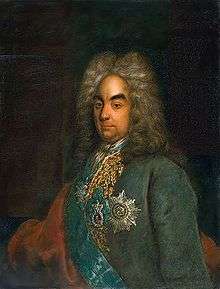 | Count Pyotr Andreyevich Tolstoy (1645–1729) | 8 February 1726 | 6 May 1727 | ||||
.jpg) | Count Karl Fridrikh Golshteyn-Gottorpsky (1700–1739) | 8 February 1726 (or March 1726)[6] | 25 July 1727 | ||||
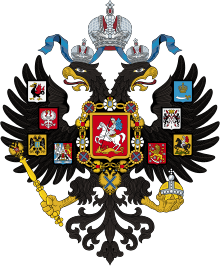 | Prince Alexey Grigoryevich Dolgorukov (?–1734) | 3 February 1728 | 4 March 1730 | ||||
.jpg) | Prince Vasily Lukich Dolgorukov (1670–1739) | 6 April 1729 | 4 March 1730 | ||||
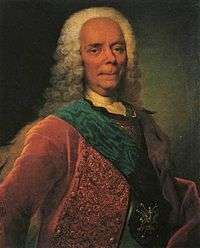 | Prince Vasily Vladimirovich Dolgorukov (1667–1746) | 19 January 1730 | 4 March 1730 | ||||
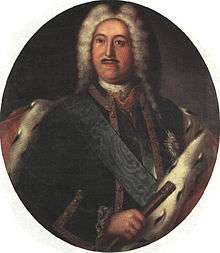 | Prince Mikhail Mikhailovich Golitsyn (1675–1730) | 19 January 1730 | 4 March 1730 | ||||
| Cabinet ministers of the Russian Empire (1731–1741) | |||||||
.jpg) | Count Gavriil Ivanovich Golovkin (1660–1734) | 10 November 1731 | 20 January 1734 | Anna.jpg) (1730–1740) Ivan VI .jpg) (1740–1741) | |||
_%D0%9E%D1%81%D1%82%D0%B5%D1%80%D0%BC%D0%B0%D0%BD.jpg) | Count Andrey Ivanovich Osterman (1686–1747) | 20 January 1734 | 10 November 1740 | ||||
 | Count Khristofor Antonovich Minikh (1683–1767) | 10 November 1740 | 3 March 1741 | ||||
_%D0%9E%D1%81%D1%82%D0%B5%D1%80%D0%BC%D0%B0%D0%BD.jpg) | Count Andrey Ivanovich Osterman (1686–1747) (2nd time) | 3 March 1741 | 25 November 1741 | ||||
| Conferency ministers at the Highest Court of the Russian Empire (1756–1762) | |||||||
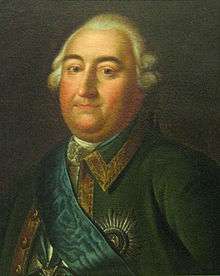 | Stepan Fyodorovich Apraksin (1702–1758) | 14 March 1756 | 1 October 1757 | Elizabeth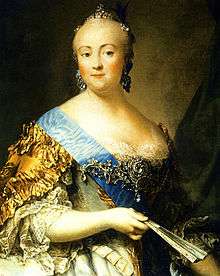 (1741–1762) Peter III (1762) | |||
 | Count Mikhail Petrovich Bestuzhev-Ryumin (1688–1760) | 14 March 1756 | 2 October 1757 | ||||
 | Prince Mikhail Mikhailovich Golitsyn (1684–1764) | 14 March 1756 | 17 December 1757 | ||||
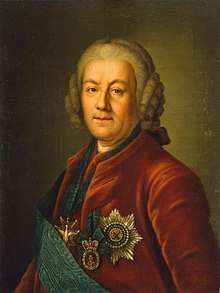 | Count Alexey Petrovich Bestuzhev-Ryumin (1693–1768) | 14 March 1756 | 14 February 1758 | ||||
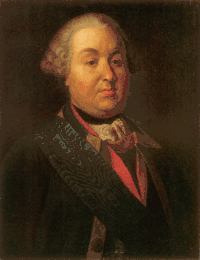 | Count Alexander Borisovich Buturlin (1694–1767) | 14 March 1756 | 17 October 1760 | ||||
 | Count Peter Ivanovich Shuvalov (1711–1762) | 14 March 1756 | 4 January 1762 | ||||
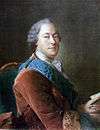 | Count Mikhail Illarionovich Vorontsov (1714–1767) | 14 March 1756 | 20 January 1762 | ||||
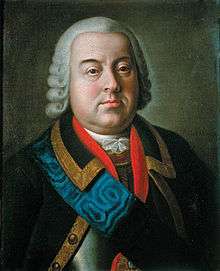 | Prince Nikita Yuryevich Trubetskoy (1699–1767) | 14 March 1756 | 20 January 1762 | ||||
 | Count Alexander Ivanovich Shuvalov (1710–1771) | 14 March 1756 | 20 January 1762 | ||||
| Grand Duke Peter Fyodorovich Romanov (subsequently Emperor Peter III) (1728–1762) | 14 March 1756 | 28 January 1762 | |||||
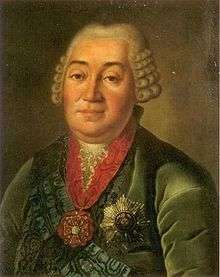 | Prince Yakov Petrovich Shakhovsky (1705–1777) | 16 September 1760 | 25 December 1761 | ||||
 | Ivan Ivanovich Neplyuev (1693–1773) | 16 September 1760 | 20 January 1762 | ||||
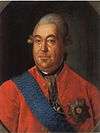 | Count Roman Illarionovich Vorontsov (1707–1783) | 28 December 1761 | 20 January 1762 | ||||
| Members of the Imperial Council of the Russian Empire (1762) | |||||||
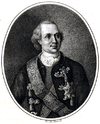 | Prince Georg Ludwig von Holstein-Gottorp (1719–1763) | 28 January 1762 | 28 June 1762 | Peter III (1762) | |||
 | Count Pyotr Avgust Fridrikh Golshteyn-Beksky (1696–1775) | 28 January 1762 | 28 June 1762 | ||||
 | Count Khristofor Antonovich Minikh (1683–1767) | 28 January 1762 | 28 June 1762 | ||||
 | Prince Nikita Yuryevich Trubetskoy (1699–1767) | 28 January 1762 | 28 June 1762 | ||||
 | Count Mikhail Illarionovich Vorontsov (1714–1767) | 28 January 1762 | 28 June 1762 | ||||
 | Aleksandr Nikitich Vilbua (1713–1788) | 28 January 1762 | 28 June 1762 | ||||
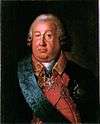 | Prince Mikhail Nikitich Volkonsky (1713–1788) | 28 January 1762 | 28 June 1762 | ||||
 | Aleksey Petrovich Melgunov (1722–1788) | 28 January 1762 | 28 June 1762 | ||||
| Heads of Council Affairs at the Highest Court (Highest Council) of the Russian Empire (1768–1801) | |||||||
 | Stepan Fyodorovich Strekalov (1728–1805) | 17 November 1768 | 1776 | Catherine II.jpg) (1762–1796) | |||
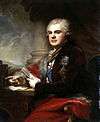 | Count Alexander Nikolayevich Samoylov (1744–1814) | 1776 | 1787 | ||||
 | Ivan Andreyevich Veydemeyer (1752–1820) | 1787 | 18 November 1796 | ||||
.jpg) | Gavriil Romanovich Derzhavin (1743–1816) | 18 November 1796 | 22 November 1796 | Paul I (1796–1801) | |||
 | Ivan Andreyevich Veydemeyer (1752–1820) (2nd time) | 18 November 1796 | 26 March 1801 | ||||
| Chairmen of the Committee of Ministers of the Russian Empire (1810–1903) | |||||||
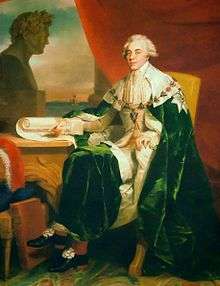 | Count Nikolay Petrovich Rumyantsev[lower-alpha 1] (1754–1826) | 1810 | 1812 | Alexander I.jpg) (1801–1825) | |||
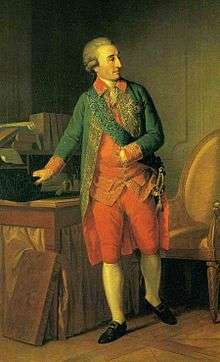 | Count and Prince Nikolay Ivanovich Saltykov (1736–1816) | 29 March 1812[7] | 9 September 1812 (disputed)[lower-alpha 2] 16 May 1816 | ||||
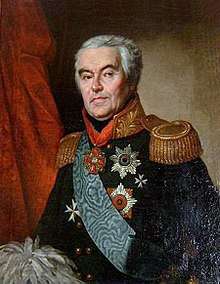 | Count Sergey Kuzmich Vyazmitinov (disputed)[lower-alpha 3] (1744–1819) | 9 September 1812 | 15 October 1816 | ||||
.jpg) | Prince Pyotr Vasilyevich Lopukhin (1753–1827) | 25 May 1816[8] | 6 April 1827 | ||||
Nicholas I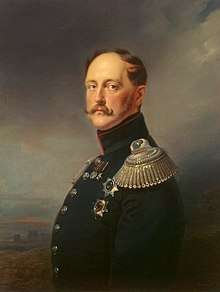 (1825–1855) | |||||||
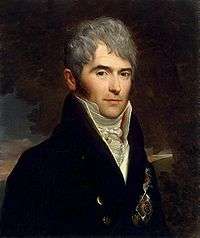 | Prince Viktor Pavlovich Kochubey (1768–1834) | 29 April 1827[9] | 3 June 1834 | ||||
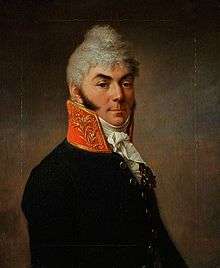 | Count Nikolay Nikolayevich Novosiltsev (1761–1838) | 11 July 1834[10] | 8 April 1838 | ||||
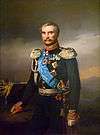 | Prince Illarion Vasilyevich Vasilchikov (1776–1847) | 9 April 1838[11] | 21 February 1847 | ||||
 | Count Vasily Vasilyevich Levashov (1783–1848) | 31 December 1847[12] | 23 September 1848 | ||||
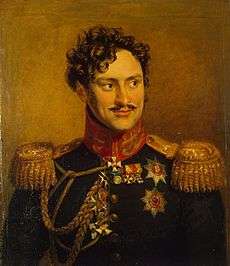 | Prince Alexander Ivanovich Chernyshyov (1785–1857) | 1 December 1848[13] | 5 April 1856[13] | ||||
Alexander II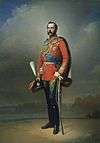 (1855–1881) | |||||||
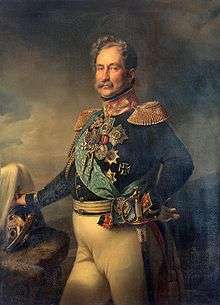 | Prince Alexey Fyodorovich Orlov (1787–1862) | May 1857[14] | January 1861[15] | ||||
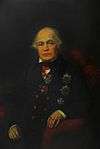 | Count Dmitry Nikolayevich Bludov (1785–1864) | 12 November 1861 | 19 February 1864 | ||||
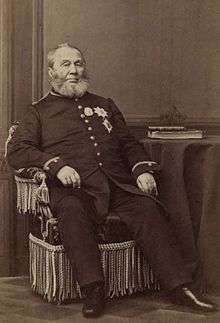 | Prince Pavel Pavlovich Gagarin (1789–1872) | 24 February 1864[16] | 21 February 1872 | ||||
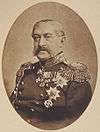 | Count Pavel Nikolayevich Ignatyev (1797–1879) | 21 February 1872[17] | 20 December 1879[17] | ||||
 | Count Pyotr Aleksandrovich Valuyev (1815–1890) | 25 December 1879[18] | 4 October 1881[18] | ||||
Alexander III (1881–1894) | |||||||
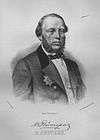 | Count Mikhail Khristoforovich Reytern (1820–1890) | 4 October 1881[19] | 30 December 1886[19] | ||||
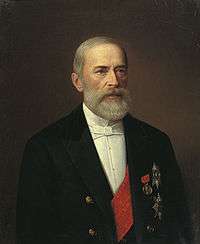 | Nikolay Khristianovich Bunge (1823–1895) | 1 January 1887[20] | 3 June 1895[20] | ||||
St. Nicholas II.jpg) (1894–1917) | |||||||
 | Ivan Nikolayevich Durnovo (1834–1903) | 15 October 1895[21] | 29 May 1903 | ||||
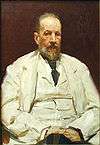 | Count Sergei Yulyevich Witte (1849–1915) | 16 August 1903[22] | 22 April 1906[22] | ||||
Russian Empire (1905–1917)
The modern government type in Russia came after the establishment of the Council of Ministers on 1 November 1905, created for the "management and union action principal chiefs of departments on subjects like law and senior public administration", and modelled on the relevant institutions within the constitutional states, when all the ministries and directorates have been declared part of the unified state management. The first Prime Minister was Count Sergei Witte, who was appointed on 6 November 1905.[23]
| Portrait | Name (Birth–Death) |
Term of office | Political party | Legislature (Election) |
Emperor | ||||
|---|---|---|---|---|---|---|---|---|---|
| 1 | 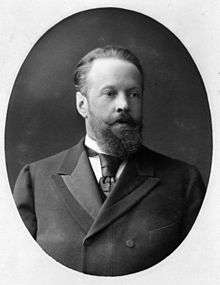 |
Count Sergey Yulyevich Witte (1849–1915) |
• | 6 November 1905 | 5 May 1906 | Independent | None | St. Nicholas II.jpg) (1894–1917) | |
| 2 | .jpg) |
Ivan Logginovich Goremykin (1839–1917) |
1 | 5 May 1906 | 21 July 1906 | Independent | I (1906) | ||
| 3 | 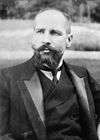 |
Pyotr Arkadyevich Stolypin (1862–1911) |
• | 21 July 1906 | 18 September 1911 (Died in office) |
Independent | II (Jan 1907) | ||
| III (Oct 1907) | |||||||||
| 4 | 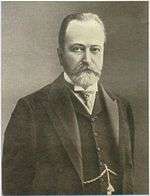 |
Count Vladimir Nikolayevich Kokovtsov (1853–1943) |
• | 22 September 1911 | 12 February 1914 | Independent | |||
| IV (1912) | |||||||||
| (2) | .jpg) |
Ivan Logginovich Goremykin (1839–1917) |
2 | 12 February 1914 | 2 February 1916 | Independent | |||
| 5 | .jpg) |
Baron Boris Vladimirovich Shtyurmer (1848–1917) |
• | 2 February 1916 | 23 November 1916 | Independent | |||
| 6 |  |
Alexander Fyodorovich Trepov (1862-1928) |
• | 23 November 1916 | 20 January 1917 | Independent | |||
| 7 | 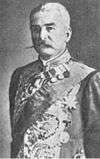 |
Prince Nikolai Dmitriyevich Golitsyn (1850-1925) |
• | 20 January 1917 | 12 March 1917 | Independent | |||
Provisional Government/Russian Republic (1917)
After the alleged abdication of Nicholas II from the throne in favor of his brother Michael, Michael also abdicated, before the convening of the Constituent Assembly. On 1 September 1917, Russia was proclaimed a republic. At this period a provisional government was formed, the Prime Minister was the head of state.
| Portrait | Name (Birth–Death) |
Term of office | Political party | |||
|---|---|---|---|---|---|---|
| 8 |  |
Prince Georgy Yevgenyevich Lvov (1861–1925) |
• | 15 March 1917 | 20 July 1917 | Constitutional Democratic Party |
| 9 | 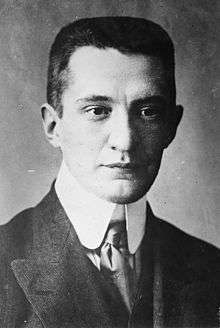 |
Alexander Fyodorovich Kerensky (1881–1970) |
1 | 21 July 1917 | 1 September 1917 | Socialist Revolutionary Party |
| 2 | 1 September 1917 | 7 November 1917 | ||||
White Movement (1918–1924)
The heads of Government of the White Movement during the Civil War were de facto Prime Ministers in exile.
| Portrait | Name (Birth–Death) |
Term of office | Political party | Head of State | ||||
|---|---|---|---|---|---|---|---|---|
 |
Vladimir Kazimirovich Volsky (1877–1937) |
• | 8 June 1918 | 23 September 1918 | Socialist Revolutionary Party | Vladimir Volsky (1918) | ||
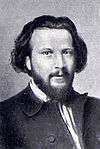 |
Nikolai Dimitrovich Avksentiev (1878–1943) |
• | 23 September 1918 | 18 November 1918 | Socialist Revolutionary Party | Nikolai Avksentiev (1918) | ||
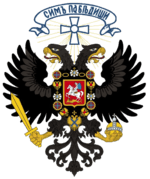 |
Pyotr Vasilyevich Vologodsky (1863–1925) |
• | 18 November 1918 | 22 November 1919 | Socialist Revolutionary Party | Alexander Kolchak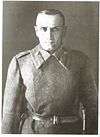 (1918 — 1920) | ||
 |
Viktor Nikolayevich Pepelyayev (1885-1920) |
• | 22 November 1919 | 4 January 1920 | Constitutional Democratic Party | |||
 |
Alexander Vasilyevich Krivoshein (1857-1921) |
• | 11 April 1920 | 11 November 1920 | Independent | Pyotr Wrangel (1920 — 1924) | ||
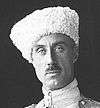 |
Pyotr Nikolayevich Wrangel (1878-1928) |
• | 5 April 1921 | November 1924 | Independent | |||
Russian Soviet Federative Socialist Republic (1917–1991)
Prime Ministers of the Russian SFSR.
| Portrait | Name (Birth–Death) |
Term of office | Political party | Legislature (Election) |
Head of State | ||||
|---|---|---|---|---|---|---|---|---|---|
| 10 | Vladimir Ilyich Ulyanov ("Lenin") (1870–1924) |
• | 8 November 1917 | 21 January 1924 (Died in office) |
Communist Party | ARCEC | Lev Kamenev (1917) | ||
Yakov Sverdlov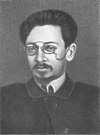 (1917 — 1919) | |||||||||
Mikhail Vladimirsky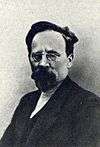 (1919) | |||||||||
Mikhail Kalinin.jpeg) (1919 — 1938) | |||||||||
| 11 | 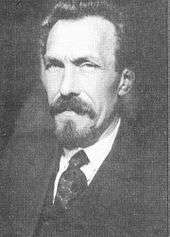 |
Alexey Ivanovich Rykov (1881–1938) |
• | 2 February 1924 | 18 May 1929 | Communist Party | |||
| 12 | .svg.png) |
Sergey Ivanovich Syrtsov (1883–1937) |
• | 18 May 1929 | 3 November 1930 | Communist Party | |||
| 13 | 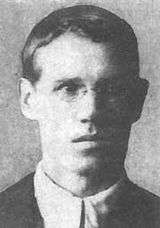 |
Daniil Yegorovich Sulimov (1890–1937) |
• | 3 November 1930 | 27 July 1937 | Communist Party | |||
| 14 | 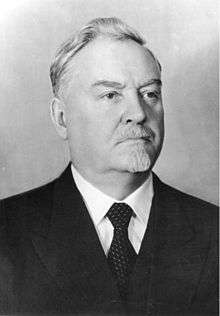 |
Nikolay Alexandrovich Bulganin (1895–1975) |
1 | 27 July 1937 | 1938 | Communist Party | |||
| 2 | 1938 | 17 September 1938 | I (1938) |
Aleksei Badayev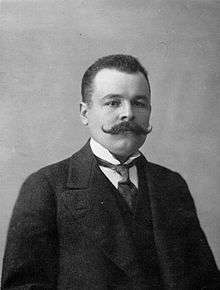 (1938 — 1944) | |||||
| 15 | .svg.png) |
Vasily Vasilyevich Vakhrushev (1902–1947) |
• | 29 July 1939 | 2 June 1940 | Communist Party | |||
| 16 | .svg.png) |
Ivan Sergeyevich Khokhlov (1895–1973) |
• | 2 June 1940 | 5 May 1942 | Communist Party | |||
| 17 | 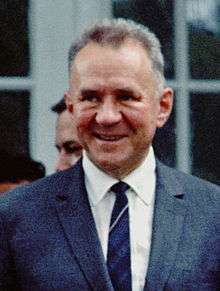 |
Alexey Nikolayevich Kosygin (1904–1980) |
• | 2 May 1943 | 23 March 1946 | Communist Party | |||
Nikolay Shvernik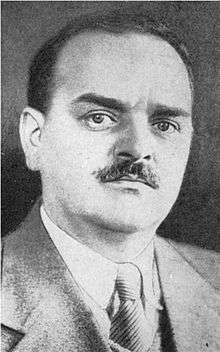 (1944 — 1946) | |||||||||
| 18 | .svg.png) |
Mikhail Ivanovich Rodionov (1907–1950) |
1 | 23 March 1946 | 1947 | Communist Party | |||
| 2 | 1947 | 9 March 1949 | II (1947) |
Ivan Vlasov.svg.png) (1946 — 1950) | |||||
| 19 | .svg.png) |
Boris Nikolayevich Chernousov (1908–1978) |
1 | 9 March 1949 | 1951 | Communist Party | |||
| 2 | 1951 | 20 October 1952 | III (1951) |
Mikhail Tarasov.svg.png) (1950 — 1959) | |||||
| 20 | .svg.png) |
Alexander Mikhailovich Puzanov (1906–1998) |
1 | 20 October 1952 | 1955 | Communist Party | |||
| 2 | 1955 | 24 January 1956 | IV (1955) | ||||||
| 21 | .svg.png) |
Mikhail Alexeyevich Yasnov (1906–1991) |
• | 24 January 1956 | 19 December 1957 | Communist Party | |||
| 22 | .svg.png) |
Frol Romanovich Kozlov (1908–1965) |
• | 19 December 1957 | 31 March 1958 | Communist Party | |||
| 23 | .svg.png) |
Dmitry Stepanovich Polyansky (1917–2001) |
1 | 31 March 1958 | 1959 | Communist Party | |||
Nikolay Ignatov.svg.png) (1959) | |||||||||
| 2 | 1959 | 23 November 1962 | V (1959) |
Nikolay Organov.svg.png) (1959 – 1962) | |||||
| 24 | .svg.png) |
Gennady Ivanovich Voronov (1910–1994) |
1 | 23 November 1962 | 1963 | Communist Party | |||
Nikolay Ignatov.svg.png) (1962 – 1966) | |||||||||
| 2 | 1963 | 1967 | VI (1963) | ||||||
Mikhail Yasnov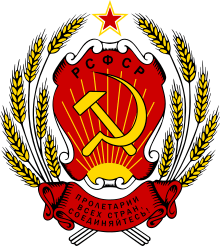 (1966 – 1985) | |||||||||
| 3 | 1967 | 23 July 1971 | VII (1967) | ||||||
| 25 |  |
Mikhail Sergeyevich Solomentsev (1913–2008) |
1 | 28 July 1971 | 1975 | Communist Party | VIII (1971) | ||
| 2 | 1975 | 1980 | IX (1975) | ||||||
| 3 | 1980 | 24 June 1983 | X (1980) | ||||||
| 26 |  |
Vitaly Ivanovich Vorotnikov (1926–2012) |
1 | 24 June 1983 | 1985 | Communist Party | |||
| 2 | 1985 | 3 October 1988 | XI (1985) |
Vladimir Orlov (1985 – 1988) | |||||
| 27 |  |
Alexander Vladimirovich Vlasov (1932–2002) |
• | 3 October 1988 | 15 June 1990 | Communist Party | Vitaly Vorotnikov (1988 – 1990) | ||
Boris Yeltsin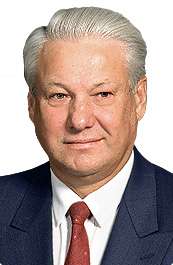 (1990 – 1991) | |||||||||
| 28 |  |
Ivan Stepanovich Silayev (1930–) |
1 | 15 June 1990 | 11 July 1991 | Communist Party | XII (1990) | ||
| 2 | 12 July 1991 | 26 September 1991 | |||||||
| P[lower-alpha 4] | Boris Nikolayevich Yeltsin (1931–2007) |
• | 6 November 1991 | 25 December 1991 | Independent | ||||
Russian Federation (since 1991)
The Heads of Government of Russia after the collapse of the Soviet Union. The first Head of Government of post-Soviet Russia was Viktor Chernomyrdin.
| Portrait | Name (Birth–Death) |
Term of office | Political party | Legislature (Election) |
President | ||||
|---|---|---|---|---|---|---|---|---|---|
| P | Boris Nikolayevich Yeltsin (1931–2007) |
• | 25 December 1991 | 15 June 1992 | Independent | XII (1990) |
Boris Yeltsin (1991–1999) | ||
| 29 | 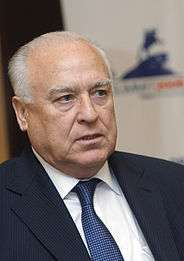 |
Viktor Stepanovich Chernomyrdin (1938–2010) |
1 | 14 December 1992 | 9 August 1996 | Our Home – Russia | |||
| I (1993) | |||||||||
| II (1995) | |||||||||
| 2 | 10 August 1996 | 23 March 1998 | |||||||
| 30 | .jpg) |
Sergey Vladilenovich Kiriyenko (1962–) |
• | 24 April 1998 | 23 August 1998 | Independent | |||
| 31 | 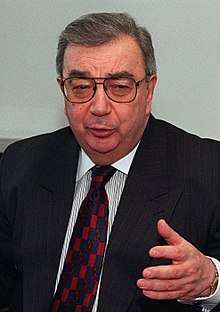 |
Yevgeny Maximovich Primakov (1929–2015) |
• | 11 September 1998 | 12 May 1999 | Fatherland – All Russia | |||
| 32 | .jpg) |
Sergey Vadimovich Stepashin (1952–) |
• | 19 May 1999 | 9 August 1999 | Independent | |||
| 33 | .jpeg) |
Vladimir Vladimirovich Putin (1952–) |
1 | 16 August 1999 | 7 May 2000 | Unity | |||
| III (1999) |
Vladimir Putin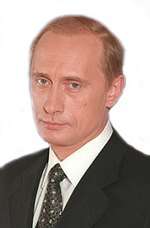 (2000–2008)[lower-alpha 5] | ||||||||
| 34 | 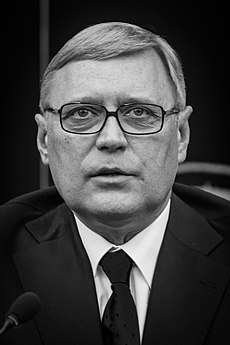 |
Mikhail Mikhailovich Kasyanov (1957–) |
• | 17 May 2000 | 24 February 2004 | Independent | |||
| IV (2003) | |||||||||
| 35 | .jpeg) |
Mikhail Yefimovich Fradkov (1950–) |
1 | 5 March 2004 | 7 May 2004 | Independent | |||
| 2 | 12 May 2004 | 14 September 2007 | |||||||
| 36 |  |
Viktor Alexeyevich Zubkov (1941–) |
• | 14 September 2007 | 7 May 2008 | United Russia | |||
| V (2007) | |||||||||
| (33) | .jpeg) |
Vladimir Vladimirovich Putin (1952–) |
2 | 8 May 2008 | 7 May 2012 | United Russia | Dmitry Medvedev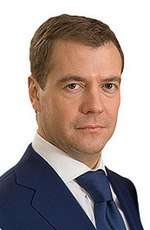 (2008–2012) | ||
| VI (2011) | |||||||||
| 37 |  |
Dmitry Anatolyevich Medvedev (1965–) |
1 | 8 May 2012 | 7 May 2018 | United Russia | Vladimir Putin.jpg) (2012–) | ||
| VII (2016) | |||||||||
| 2 | 8 May 2018 | Incumbent | |||||||
Acting Prime Ministers
- Vladimir Kokovtsov: 18–22 September 1911
- Konstantin Pamfilov: 5 May 1942 – 2 May 1943
- Oleg Lobov: 26 September–6 November 1991
- Yegor Gaidar: 15 June–14 December 1992
- Sergey Kiriyenko: 23 March–24 April 1998
- Viktor Chernomyrdin: 9–10 August 1996 and 23 August–11 September 1998
- Sergey Stepashin: 12–19 May 1999
- Vladimir Putin: 9–16 August 1999
- Mikhail Kasyanov: 7–17 May 2000
- Viktor Khristenko: 24 February–5 March 2004
- Mikhail Fradkov: 7–12 May 2004 and 12–14 September 2007
- Viktor Zubkov: 7–8 May 2008 and 7–8 May 2012
- Dmitry Medvedev: 7–8 May 2018
Living former Prime Ministers
As of October 2018, there are seven living former Prime Ministers. The most recent death of a former Prime Minister was that of Yevgeny Primakov (1998–1999) on 26 June 2015, aged 85.
| Name | Term of office | Born |
|---|---|---|
| Ivan Silayev | 1990–1991 | 21 October 1930 |
| Sergey Kiriyenko | 1998 | 26 July 1962 |
| Sergei Stepashin | 1999 | 2 March 1952 |
| Vladimir Putin | 1999–2000 and 2008–2012 | 7 October 1952 |
| Mikhail Kasyanov | 2000–2004 | 8 December 1957 |
| Mikhail Fradkov | 2004–2007 | 1 September 1950 |
| Viktor Zubkov | 2007–2008 | 15 September 1941 |
Timeline
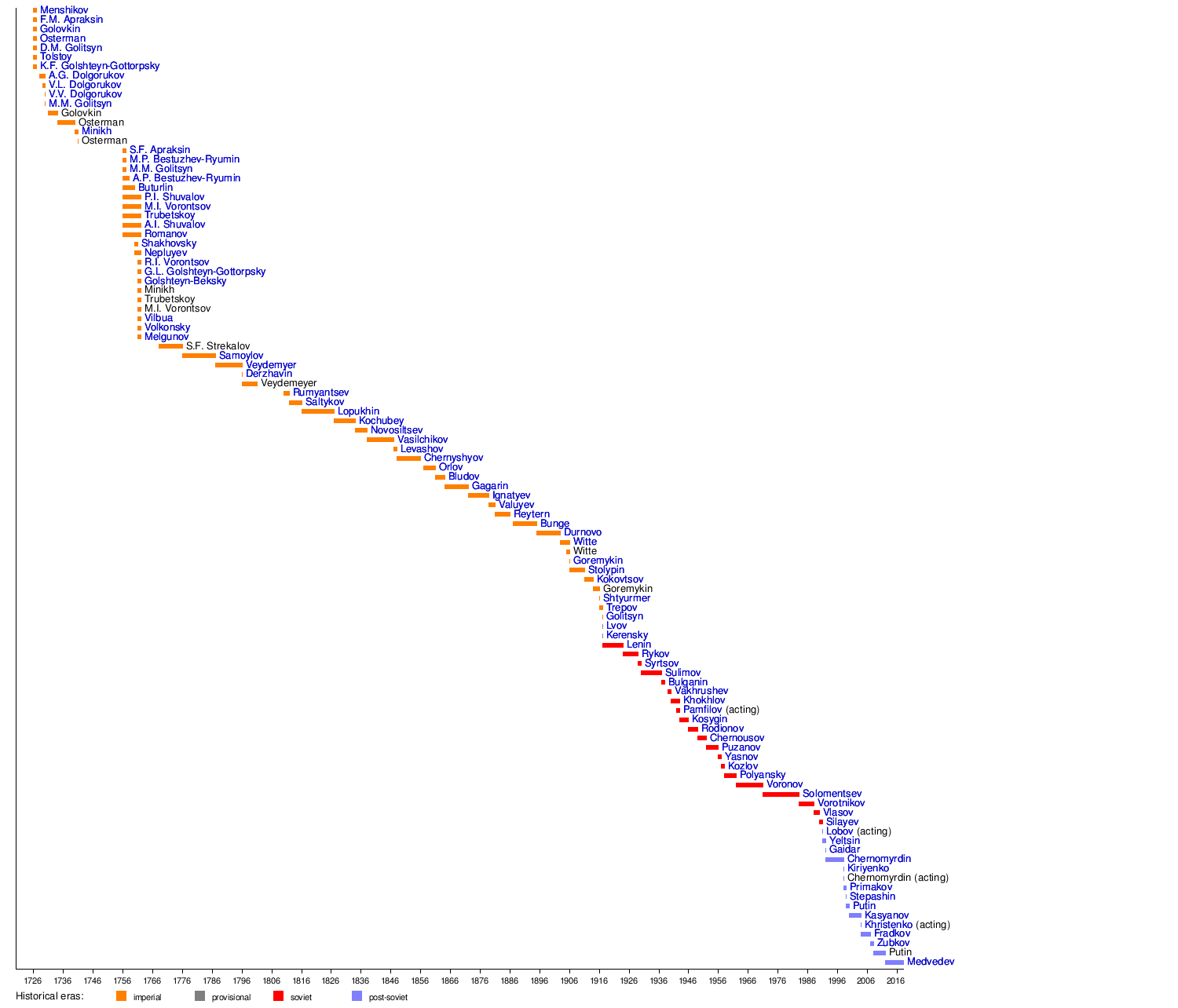
See also
Footnotes
- ↑ De facto (unofficial) Chairman of the Committee of Ministers from 8 September 1802 to 1809 was Alexander Romanovich Vorontsov
- ↑ Sources which list Vyazmitinov as Saltykov's successor state a date of 9 September 1812; other sources assert that Saltykov was in office until his death
- ↑ Some sources (such as the Large Soviet Encyclopedia) list Vyazmitinov as committee minister, while other (such as the History of the Fatherland encyclopedia) don't mention him at all and instead list Lopukhin as the successor of Saltykov
- ↑ Headed the government as President of Russia, was not the Prime Minister.
- ↑ De facto took this position on 31 December 1999, when he became Acting President after the resignation of Boris Yeltsin. Elected President on 26 March 2000, officially took office on 7 May 2000.
Notes
- ↑ "Комитет министров". Brockhaus and Efron Encyclopedic Dictionary: In 86 Volumes (82 Volumes and 4 Additional Volumes). St. Petersburg. 1890–1907.
- ↑ "Совет министров". Brockhaus and Efron Encyclopedic Dictionary: In 86 Volumes (82 Volumes and 4 Additional Volumes). St. Petersburg. 1890–1907.
- ↑ "Ministers' Council established in Russia". Presidential Library Named After Boris Yeltsin. Retrieved 10 August 2014.
- ↑ "The Russian Government – Dmitry Medvedev". Government of the Russia Federation. Retrieved 4 April 2014.
- ↑ 7 царских председателей Совета министров
- ↑ "Верховный тайный совет". Brockhaus and Efron Encyclopedic Dictionary: In 86 Volumes (82 Volumes and 4 Additional Volumes). St. Petersburg. 1890–1907.
- ↑ Салтыков, князь Николай Иванович [Prince Nikolay Ivanovich Saltykov] (in Russian). Retrieved 7 April 2014.
- ↑ Неизвестная Фемида : документы, события, люди [The Unknown Themis: Documents, Events, People] (in Russian). ОЛМА Медиа Групп. 2003. p. 93. ISBN 978-5-224-04224-1.
- ↑ Кочубей, князь Виктор Павлович [Prince Viktor Pavlovich Kochubey] (in Russian). Retrieved 8 April 2014.
- ↑ B. V. Ananych, ed. (2008). Управленческая элита Российской империи: история министерств, 1802–1917 [Ruling Elite of the Russian Empire: History of Ministries, 1802–1917] (in Russian). "Лики России".
- ↑ Васильчиков Илларион Васильевич — Биографический указатель [Illarion Vasilyevich Vasilchikov – Biography] (in Russian). Archived from the original on 9 February 2014. Retrieved 5 April 2014.
- ↑ Vladimir Nikolayevich Balyazin; Voldemar Nikolayevich Balyazin (2008). Царский декамерон: От Николая I до Николая II. Исторические книги В.Н. Балязина (Historical Books by V. N. Balyazin) (in Russian). 2. ОЛМА Медиа Групп. p. 49. ISBN 978-5-373-01976-7.
- 1 2 Александр Иванович Чернышев — Биографический указатель [Aleksandr Ivanovich Chernyshov] (in Russian). Retrieved 5 April 2014.
- ↑ Землевладельцы Панинского района. Князь Орлов Алексей Фёдорович [Landowners of the Panin Rayon. Prince Alexey Fyodorovich Orlov] (in Russian). Retrieved 9 April 2014.
- ↑ Орлов князь Алексей Федорович [Prince Aleksey Fyodorovich Orlov] (in Russian). Archived from the original on 7 April 2014. Retrieved 4 April 2014.
- ↑ Павел Павлович Гагарин [Pavel Pavlovich Gagarin] (in Russian). Russian Empire. Archived from the original on 7 April 2014. Retrieved 5 April 2014.
- 1 2 Игнатьев Павел Николаевич [Pavel Nikolayevich Ignatyev] (in Russian). Russian Empire. Archived from the original on 7 April 2014. Retrieved 5 April 2014.
- 1 2 Валуев Петр Александрович [Pyotr Aleksandrovich Valuyev] (in Russian). Russian Empire. Archived from the original on 7 April 2014. Retrieved 5 April 2014.
- 1 2 Рейтерн Михаил Христофорович [Mikhail Khristoforovich Reytern] (in Russian). Russian Empire. Archived from the original on 7 April 2014. Retrieved 6 April 2014.
- 1 2 Бунге Николай Христианович [Nikolay Khristianovich Bunge] (in Russian). Russian Empire. Archived from the original on 8 April 2014. Retrieved 7 April 2014.
- ↑ Дурново Иван Николаевич [Ivan Nikolayevich Durnovo] (in Russian). Russian Empire. Archived from the original on 8 April 2014. Retrieved 7 April 2014.
- 1 2 "Витте Сергей Юлиевич (sic!)" [Sergey Yuliyevich (sic!) Witte] (in Russian). Russian Empire. Archived from the original on 8 April 2014. Retrieved 7 April 2014.
- ↑ Преобразован Совет министров Российской империи
References
- S. M. Seredonin, ed. (1902). Т. 1 : Комитет министров в царствование императора Александра Первого (1802 г. сентября 8 – 1825 г. ноября 19). – 1902. [Vol. 1: Committee of Ministers During the Reign of Emperor Aleksandr the First (8 September 1802 – 19 November 1825). – 1902] (in Russian). 1. Government Public Historical Library of Russia.
- B. Yu. Ivanov; B. M. Karev; E. I. Kuksina; A. S. Oreshnikov; O. V. Sukhareva, eds. (1999). История отечества [History of the Fatherland] (in Russian). Moscow: Большая Российская энциклопедия (Large Russian Encyclopedia). pp. 554–576.
- K. K. Arsenyev, ed. (1911–1916). Новый энциклопедический словарь [New Encyclopedic Dictionary] (in Russian). 1–29. Saint Petersburg: F. A. Brockhaus and I. A. Efron.
- A. A. Polovtsov, ed. (1896–1918). Русский биографический словарь (Russian Biographical Dictionary) (in Russian). Saint Petersburg: Russian Imperatorial Historical Society of Saint Petersburg
